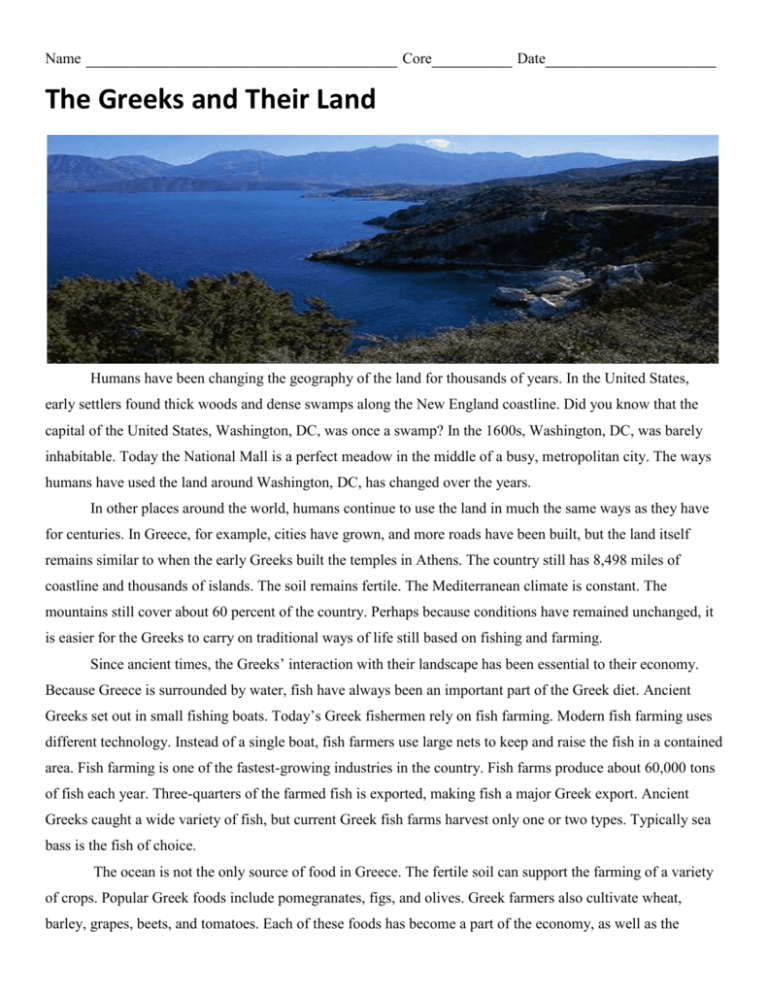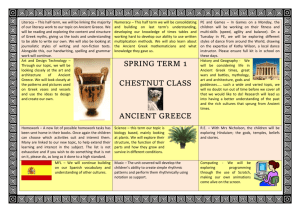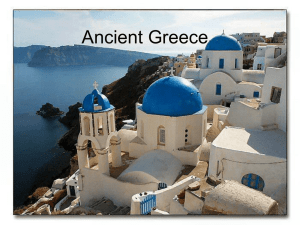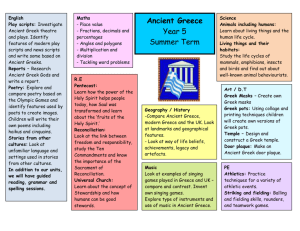The Greeks and Their Land
advertisement

Name _______________________________ Core________ Date_________________ The Greeks and Their Land Humans have been changing the geography of the land for thousands of years. In the United States, early settlers found thick woods and dense swamps along the New England coastline. Did you know that the capital of the United States, Washington, DC, was once a swamp? In the 1600s, Washington, DC, was barely inhabitable. Today the National Mall is a perfect meadow in the middle of a busy, metropolitan city. The ways humans have used the land around Washington, DC, has changed over the years. In other places around the world, humans continue to use the land in much the same ways as they have for centuries. In Greece, for example, cities have grown, and more roads have been built, but the land itself remains similar to when the early Greeks built the temples in Athens. The country still has 8,498 miles of coastline and thousands of islands. The soil remains fertile. The Mediterranean climate is constant. The mountains still cover about 60 percent of the country. Perhaps because conditions have remained unchanged, it is easier for the Greeks to carry on traditional ways of life still based on fishing and farming. Since ancient times, the Greeks’ interaction with their landscape has been essential to their economy. Because Greece is surrounded by water, fish have always been an important part of the Greek diet. Ancient Greeks set out in small fishing boats. Today’s Greek fishermen rely on fish farming. Modern fish farming uses different technology. Instead of a single boat, fish farmers use large nets to keep and raise the fish in a contained area. Fish farming is one of the fastest-growing industries in the country. Fish farms produce about 60,000 tons of fish each year. Three-quarters of the farmed fish is exported, making fish a major Greek export. Ancient Greeks caught a wide variety of fish, but current Greek fish farms harvest only one or two types. Typically sea bass is the fish of choice. The ocean is not the only source of food in Greece. The fertile soil can support the farming of a variety of crops. Popular Greek foods include pomegranates, figs, and olives. Greek farmers also cultivate wheat, barley, grapes, beets, and tomatoes. Each of these foods has become a part of the economy, as well as the myths, of the country. However, although the soil is fertile, only 40 percent of the country has the terrain for farming. Much of the available farmland has decreased with the growth of cities. The number of farmers has also decreased, as the younger generations of Greeks move to the cities for jobs. The Greeks who continue to farm often grow olive trees. Olives, a staple of Greek family meals, flourish in the rugged terrain where other crops cannot grow. The olive tree has been associated with Greece since ancient times. Through the ages, olive oil has remained an essential ingredient in Greek cooking. The method for caring for and harvesting olives has changed little over time. Ripe fruit is handpicked and brought to a mill for pressing. The fresh oil is refined and stored for use or trade. Although the storage containers have evolved from pottery jugs to cans or bottles, the method of harvesting and using olives has changed very little. The grape is another important part of Greek society and agriculture. Grapes are fermented to make wine. Greece is one of the oldest wine-producing regions in the world. The Mediterranean climate is perfect for growing grapes. In Crete archaeologists found clay winepresses and storage vessels dating back to the third century BCE. Wine was an important part of ancient Greek culture. Before partaking in the drink, they diluted it with water in large containers called kraters. Some Greeks still use the term krasi to refer to wine. Many modern wineries continue the Greek tradition of winemaking. Today winemakers use improved technology and materials, such as stainless-steel barrels. Expert winemakers train in the world’s finest schools. The use of native grapes, some cultivated since ancient times, makes Greek wine unique. Wine is yet another link to Greece’s past. Throughout its development Greek culture has maintained a close link to the land. In fact the land of Greece offers a glimpse into the past. Even today visitors to modern Greece can imagine the past by walking through groves of olive trees or watching fishermen bring their daily catch to the market. The basics have not changed. Families are at the center of the rural lifestyle of the country, as they have been for centuries. Through the generations, the people of Greece have maintained the ancient traditions of fishing and making olive oil and wine, and these traditions are important parts of Greek culture. The land is what draws many visitors to Greece, and the geography helps fuel tourism. Each year millions vacation in Greece. Tourists snorkel off the many islands in the Aegean Sea. They visit the ruins of ancient sites. Ancient Greece has been replaced with a modern, thriving culture, but there are still many ways that the Greeks maintain a connection with their history. The land is an important link to the fascinating time of ancient Greece. __________________________________________________________________________________________ Question (8 points) 1. In what ways have the Greeks maintained a connection to their ancient history? Provide details from the passage to support your answer.









